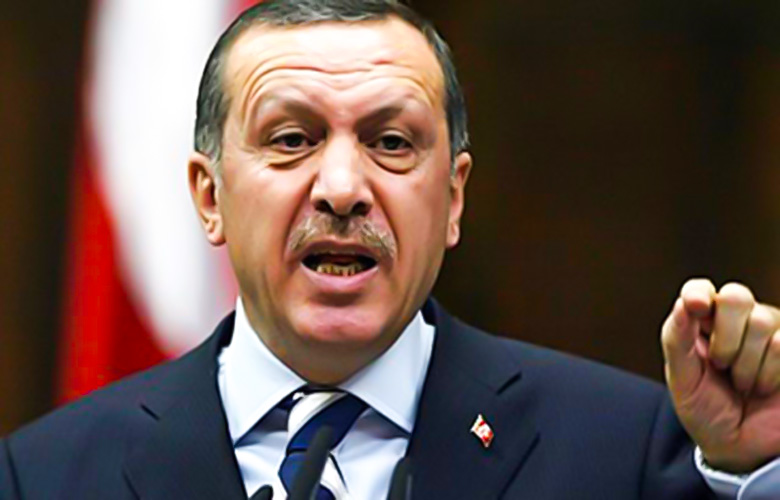AhlulBayt News Agency - Over the last few months Turkey has been making news for all the wrong reasons from unflinching support to terrorist groups, the brutal suppression of Kurdish opposition and the ongoing ruthless crackdown of the country’s free media.
President Recep Tayyip Erdogan’s response to any challenge or criticism is increasingly becoming ever extreme and cruel. Erdogan is cracking down on critical journalist and media by charging them with crimes – including terrorism.
Erdogan has gradually evolved from a so called democrat to an authoritarian president since the improperly named Justice and Development Party (AKP) came to power in 2002.
During this period Turkey has witnessed a steep deterioration in individual rights, including freedom of expression and press freedom.
Reporters without Borders has in its 2015 World Press Freedom Index ranked Turkey as 149 out of 180 countries, which is an improvement on the three previous years, when it ranked 154. However, this was due to the conditional release of 40 imprisoned journalists, who nonetheless continued to face prosecution. Turkey’s situation as a whole - when you consider such areas as cyber-censorship, lawsuits, dismissals of critical journalists and gag orders – actually worsened.
The number of journalists jailed in Turkey dramatically rose in 2015, according to a special report by the New York-based Committee to Protect Journalists (CPJ).
Turkey ranked as the fifth worst jailer of journalists globally in 2015, with tens of journalists currently behind the bars in the country.
The current Turkish government crackdown on journalists started during last year general election which saw the country return to an authoritarian leadership.
Ahead of last November’s elections last year, a mob with alleged connections to the AKP’s youth branch attacked the offices of Dogan Media Group in Istanbul in September, which houses Hürriyet newspaper, its English-language edition Hürriyet Daily News and another daily Radikal.
During the last two weeks the Turkish government took control of two major news outlets, Cihan News Agency and Zaman newspaper. Both news agencies are reportedly affiliated to US-based Muslim cleric Fethullah Gulen, a critic of Erdogan.
Erdogan and Gulen used to be political allies, but became bitter foes in 2013, when police officials and prosecutors reportedly sympathetic to Gulen opened a corruption investigation into Erdogan's inner circle. The investigation was quashed, but resulted in a cabinet reshuffle and mass protests in Turkey.
The seizures are part of a two-pronged assault by Mr Erdogan’s government on supporters of Mr Gulen and on media outlets critical of government policies. Companies run by Gulen-affiliated businesspeople have been seized and their executives investigated for supporting the imam, who until 2013 was largely supportive of Mr. Erdogan.
After AKP stunning November 1 election victory, Turkish President Erdogan revived his goal of replacing the country's parliamentary government with an executive presidency.
Western media outlets have been misleading by insinuating that the EU "treading lightly" toward Turkey's crackdown on press freedom. Free expression has been under attack in the whole of Europe for years now with journalists. There have been several instances of scholars and journalists being targeted just for denying Holocaust. So it is foolhardy to expect the EU would really be concerned about the on goings in Turkey.
With the EU increasingly seeking Turkey’s help to contain Europe’s worst refugee crisis since World War II, and Ankara’s membership talks at an early stage, Erdogan’s allies are betting the escalation won’t damage Turkey’s ties with the bloc.
Selahattin Demirtas, the Kurdish leader of the HDP, or People’s Democratic Party, says that Turkish Erdogan’s leverage over the EU on the refugee issue had given him a free hand to use the military against opponents in the country.
As the Donald Tusk, the head of the European Council arrived in Istanbul last week to discuss migration summit, Turkish authorities were busy seizing control of the country's best-selling newspaper. Brussels had already made clear that it was willing to turn a blind eye to concerns about growing authoritarianism in Turkey in return for its help in stemming the flow of people to Europe. But the timing of Friday's takeover at Zaman media group could not have been more embarrassing.
The Western countries have long idolized Erdogan and his party, hailing them as some kind of model for the rest of Muslim world. This official support has directly benefited Erdogan, allowing him to harden even more with the West brushing aside all the obvious acts committed by this developing tyranny against the press and any form of opposition.
/129
source : Al Waqt
Thursday
10 March 2016
7:19:38 AM
740097

Over the last few months Turkey has been making news for all the wrong reasons from unflinching support to terrorist groups, the brutal suppression of Kurdish opposition and the ongoing ruthless crackdown of the country’s free media.
